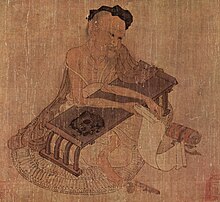Wang Wei
Wang Wei ( Chinese 王維 / 王维 , Pinyin Wáng Wéi ; * 699 or 701; † 759 or 761) was a poet , painter , musician and statesman of the Chinese Tang dynasty . He is best known for his poems, 29 of which were included in the classic and widely available anthology Three Hundred Tang Poems . Alongside Li Bai , Du Fu and Meng Haoran , with whom he was friends, he is considered to be one of the greatest poets of the Tang period. Wang Wei is also considered one of the greatest painters, calligraphers and musicians of his time, but these works have not survived.
Since Wang Wei said Chan - Buddhism and Daoism was close to and in meditation trained, his work is inspired by this and pushes u. a. spiritual experiences. In this way he tries to break through the external form of things and to make the true reality, the essence of things, visible in his art. From this spiritual view of things, Wang Wei's poetic peculiarity also results, allowing subject and object, feeling and landscape to flow into one another and to present them in their interweaving.
In his poetry he creates a world of harmony and suggestive imagery. Wang Wei is often classified as a natural poet because his poetry is permeated with images of nature, but he rarely describes the external form of nature, rather it is a metaphor for the expression of spiritual reality. So in many of his works z. B. mentions the white clouds that arise spontaneously from the blue emptiness of the sky and then disappear again. In his poetry they represent a symbol for the consciousness of the enlightened one who is freed from identification with his external appearance. The "realm beyond the white clouds", which he often mentions, represents the realm of transcendence , which can be experienced but not spoken.
In Wang Wei's natural poetry, two trends can be identified, the transfiguration of nature in its beauty and nature as a place of rural life in peace. A striking element in Wang Wei's nature poetry is that nature is described in its natural beauty and purity and the mixing of emotion and nature is not in the foreground, but rather shows itself as a harmony of self and world and not as a representation of nature as Expression of your own inner being. In many of Wang Wei's poems, the subject is barely perceptible and consists only of a glance sweeping across the landscape. This may be derived from Wang Wei's knowledge of the Chan, which is about attaining a pure perception of things and giving up subjectivity. Wang Wei's Buddhist impetus, however, also appears explicitly in many poems in which nature is given Buddhist terms or is presented as a place of meditation. In many of Wang Wei's poems an enigmatic aspect also appears, nature is mystified and portrayed as numinous . One of the main concerns for Wang Wei seems to be the portrayal of the distant and expansive.
literature
- Martin Benedikter: Wang Wei e P'ei Ti: Poesie del fiume Wang . Torino: Einaudi, 1956.
- Chang Yin-nan and Lewis C. Walmsley: Poems by Wang Wei . Rutland / Tokyo: Tuttle, 1958.
- Lewis Calvin and Dorothy Brush Walmsley: Wang Wei, the painter-poet . Rutland / Tokyo: Tuttle, 1968.
- GW Robinson: Poems of Wang Wei . Harmondsworth: Penguin Books, 1973. ISBN 0-14-044296-0
- Thomas Yuntong Luk: A study of the nature poetry of Wang Wei in the perspective of comparative literature . Ann Arbor: University Microfilms Int., 1981, Michigan, Univ., Diss. 1976.
- Pauline Yu: The Poetry of Wang Wei . Bloomington: Indiana University Press, 1980. ISBN 0-253-20252-3
- Marsha L. Wagner: Wang Wei . Boston: Twayne, 1981. ISBN 0-8057-6448-8
- Stephan Schuhmacher (ed. And translator): Wang Wei: Beyond the white clouds: The poems of the wise man from the southern mountains. Edited new edition, Munich: Deutscher Taschenbuch Verlag, 2009. ISBN 978-3-423-13816-1
-
Eliot Weinberger and Octavio Paz : 19 Ways of Looking at Wang Wei: How a Chinese poem is translated . Mount Kisco: Moyer Bell, 1987. ISBN 0-918825-14-8
- (expanded edition), New Directions (New York, NY), 2016. ISBN 978-0811226202
Web links
- Literature by and about Wang Wei in the catalog of the German National Library
- Poems by Wang Wei
- Original (characters and audio stream) as well as 16 different translations of the poem Im Hirschhagen
| personal data | |
|---|---|
| SURNAME | Wang, Wei |
| ALTERNATIVE NAMES | 王維 (traditional Chinese); 王维 (simplified Chinese); Wáng, Wéi (Pinyin) |
| BRIEF DESCRIPTION | Chinese poet, painter, musician and statesman of the Tang Dynasty |
| DATE OF BIRTH | 699 or 701 |
| DATE OF DEATH | 759 or 761 |
